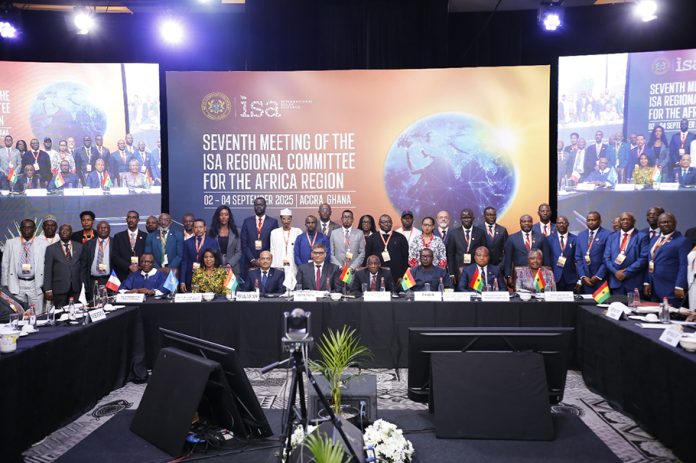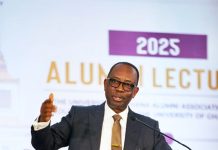Minister for Energy and Green Transition, John Abdulai Jinapor, has called on African nations to urgently transform the continent’s vast solar potential into concrete projects, warning that failure to act would deepen inequality in global energy access.
“Expanding solar capacity is not only an environmental necessity, but also a significant socio-economic opportunity,” Mr Jinapor declared, as he chaired the opening of the Seventh Meeting of the International Solar Alliance (ISA) Regional Committee for Africa in Accra on Wednesday, September 3, 2025.
“About 600 million people in Africa do not have access to electricity. Africa represents 17 percent of the world’s population, yet consumes just 4 percent of global energy. Bridging this gap is our collective responsibility,” the minister said.
He stressed that Ghana, which currently serves as ISA’s African Vice President alongside Seychelles, is committed to working with member states to ensure energy aspirations are translated into bankable, financed projects on the ground.
Financing the Transition
Jinapor’s remarks set the tone for a gathering that brought together African ministers, international partners, and energy experts to discuss strategies for scaling up clean power. He urged the private sector to step in, noting that attracting capital, lowering risk premiums, and reforming regulatory frameworks would be key to unlocking Africa’s solar revolution.
Foreign Affairs Minister, Samuel Okudzeto Ablakwa, backed the call, stressing that Africa’s economic growth depends on sustainable energy.
“Partnerships formed at events like this can play a crucial role in harnessing our solar potential. With adequate financing and strategic collaborations, Africa can exceed the current 2 percent threshold of global clean energy investment. Ghana is ready to set the pace,” he said.
Madam Damilola Ogunbiyi, CEO and Special Representative of the UN Secretary-General for Sustainable Energy for All, described solar as the “fastest and least-cost path” to electrify underserved communities.
But she warned against the continent’s continued energy injustice: “The average African, even when connected, uses about 400 kilowatt-hours of energy compared to 13,000 kilowatt-hours in the United States. This is unjust and cannot be part of our transition story. Africa must invest in Africa.”
Global Support
ISA’s co-presidents, France and India, reiterated their support for Africa’s energy ambitions. France’s Ambassador to Ghana, H.E. Jules Armand Beaussieux, pledged his country’s commitment to renewable energy investments that advance climate resilience, industrial development, and job creation.
India’s High Commissioner, H.E. Manish Gupta, tied Africa’s efforts to India’s “One Sun, One World, One Grid” initiative, pointing to concrete areas of collaboration such as distributed solar projects, solar home lighting, clean cooking solutions, and healthcare applications.
ISA Director General Ashish Khanna used the platform to unveil the Alliance’s new “Moving from Ambition to Action” strategy. He said the approach would focus on innovative financing, public-private implementation partnerships, and building local capacity to ensure that African nations can develop solutions tailored to their own needs.
“Access to energy is a fundamental human right,” Khanna reminded delegates.
Key Outcomes
The Accra meeting produced several major outcomes:
- Country Partnership Frameworks (CPF): Ghana, Nigeria, and The Gambia formalised frameworks aligning solar policies with national goals.
- Solar for Agriculture: Expansion of solar-powered irrigation and cold storage to reduce Africa’s USD 400 billion food import bill while creating rural jobs.
- Africa Solar Facility: A $200 million catalytic fund, managed by Africa50, expected to mobilise more than 20 times this amount in private investment.
- Digital Transformation: Introduction of AI-driven tools and digital “twins” of energy systems to boost efficiency and reliability.









